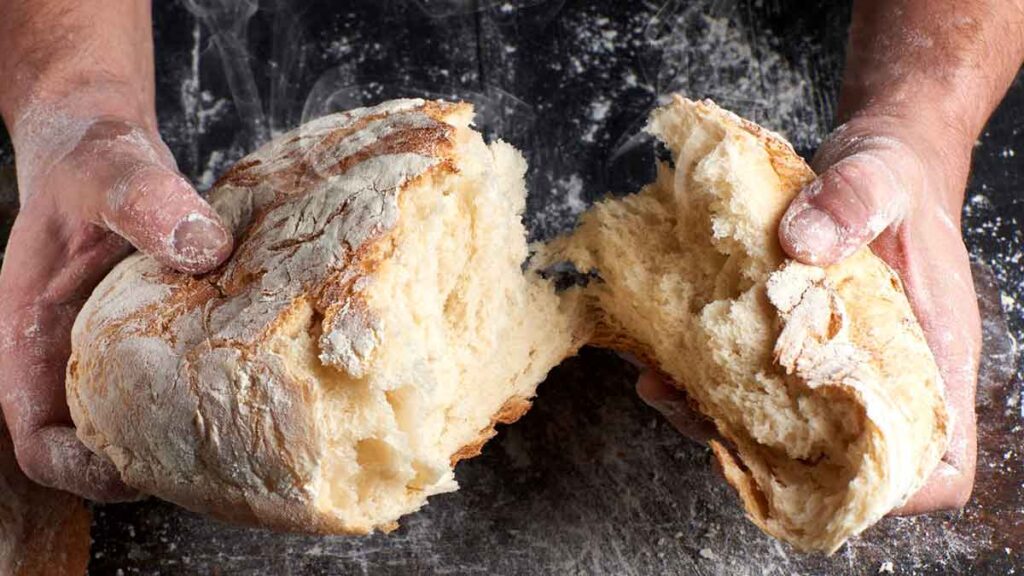
To eat or not to eat bread?
Some people say that bread is bad – just excess carbohydrates.
Others have made up their minds that bread is the root cause of all their unhappiness.
Still others are convinced that warm bread should never be eaten directly from the oven.
Where is the truth?
And why does this question arise at all about bread, but not about so much junk that the store chain offers?
There are several possible reasons.
Many people follow various fad diets.
For example, low-carb.
This could be the subject of a separate post, but there is really no convincing scientific research proving the benefits of such restrictions for a healthy person. On the contrary – in the long term, any restrictions in any of the nutrients harm health.
The World Health Organization recommends that the share of sugar in our diet be less than 5% of the total caloric content of food. This corresponds to approximately no more than 5-6 teaspoons of sugar per day. That is, sugar is strictly controlled.
As for carbohydrates in general, they should be about 40% of the calories for the day, and for people who are actively training, they can be even more – 45%, sometimes up to 50-60% of the daily energy. Apparently bread can be eaten.
Well, in moderation, of course. Our figure will not suffer from 1-2 slices daily. Not like me years ago, when to eat a bowl of beans, I would eat at least one loaf of warm bread.
Many people decide they are gluten intolerant.
There is a relatively rare disease – celiac disease, in which an inflammatory reaction develops in response to gluten intake. (gluten is a protein found mostly in wheat). As a result of this response, the mucosa of the small intestine is disturbed, which, as a rule, is accompanied by various unpleasant symptoms.
There are some diseases, basically not fully studied, in which it has not been proven whether gluten is harmful, but doctors are reinsuring themselves. For example, multiple sclerosis. This makes sense and is good to follow.
If you do not suffer from celiac disease or have no proven damage from gluten, it is better to eat whole foods – do not deprive yourself of this food for the body and the brain.
However, we cannot help but be tolerant of people who do not have characteristic signs of celiac disease, but who experience some discomfort when using gluten: diarrhea, bloating or abdominal pain. This phenomenon is called gluten sensitivity. To what extent is it caused by gluten at all, because it is difficult to isolate the causative agent outside of clinical settings. Perhaps this is the reason why almost all our products are now gluten-free.
Bread is a source of carbohydrates, and they, in addition to being a source of energy, are also food for the brain.
Avoid going gluten-free because of the advice of “Dr. Google” or “EFA” (one woman said that…). Follow the recommendations of your treating doctors.
Today there are so many breads. Who is good and who is bad?
I can’t vouch for the authenticity of the labels on the different breads, but it’s good to read them. The benefits of bread can be judged by its composition. Even if you don’t understand much about labels, look for it to be higher in protein and fiber and lower in saturated fat and sugar. And that there are no additional ingredients – preservatives, flavorings, colorings, emulsifiers, etc.
Naturally, the shelf life of such bread will be shorter.
But what prevents us from storing it in the refrigerator?
It is also desirable that the flour from which the bread is made is whole grain. Or at least a higher number (500 is white flour, over 1000 is typical). Whole grain bread has a lower glycemic index and is often higher in fiber.
When we eat bread made from whole wheat flour, there is no sudden spike in insulin (unlike eating bread made from premium wheat flour 500), which means that this way we feel energetic and full for longer.
Is it true that it is not good to eat warm and soft bread?
With this question, I keep thinking of my grandmother, who wanted us to eat bread from the day before, or even more. At the time I thought it was for economic reasons – to finish more slowly. Well, it wasn’t that. Or at least it wasn’t just that.
When we eat old bread, the starch that is its basis acquires a special structure and becomes stable and with a lower glycemic index. Unlike its hot counterpart, cold bread is digested slowly and even acts like fiber. In short, it is more useful.
Admittedly, as a kid I used to go buy bread while it was being unloaded from the truck, and by the time I got home from the store, one of the loaves would often run out, so I’d be sent back for more.
Now one of our sons has specialized in making his own bread, growing his own sourdough and doing great!
And yet: To eat or not to eat bread?
Eat good quality bread, in moderation and as part of a well-rounded balanced diet, consistent with lifestyle and physical activity.
For more details, please contact us.



